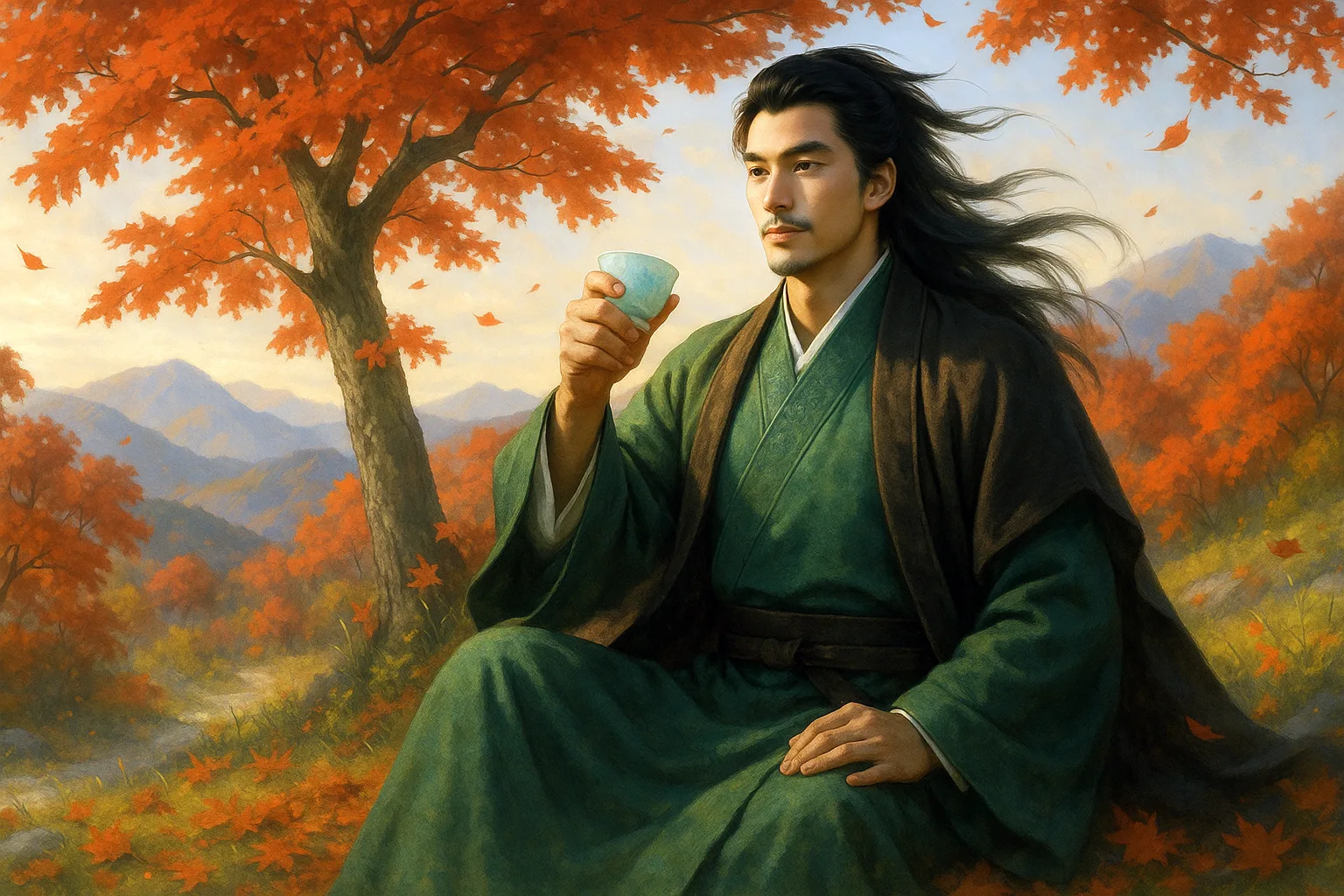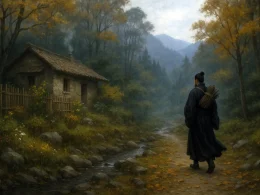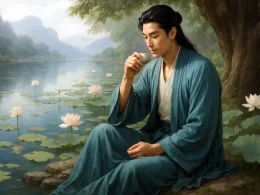Even in this good reign, how can I serve?
The lone cloud rather, the Buddhist peace....
Once more, before crossing river and sea,
I face the great Emperor's mountain-tomb.
Original Poem
「将赴吴兴登乐游原」
杜牧
清时有味是无能,闲爱孤云静爱僧。
欲把一麾江海去,乐游原上望昭陵。
Interpretation
"I climb to the Leyou Tombs before leaving for Wuxing" was written in 850 AD during the reign of Emperor Xuanzong of the Tang Dynasty. At the time, Du Mu served as a low-ranking official in the Ministry of Personnel, frustrated by his inability to realize his ambitions. Seeking a change, he requested a transfer and prepared to take up a post as the governor of Huzhou. Before leaving the capital, he ascended Leyou Plateau and gazed toward the Zhaoling Mausoleum of Emperor Taizong, using the scenery to express his concerns about the state of the nation and his own unfulfilled aspirations.
First Couplet: "清时有味是无能,闲爱孤云静爱僧。"
Qīng shí yǒu wèi shì wú néng, xián ài gū yún jìng ài sēng.
In peaceful times, there is a certain charm in being 'incompetent'; in leisure, I admire the solitary clouds, and in stillness, I admire the monks.
Du Mu begins with a self-deprecating tone, calling himself "incompetent" (无能) in a time of supposed peace. This is, in fact, an ironic statement, as it reflects his frustration at being unable to contribute meaningfully despite his talents. The "solitary clouds" (孤云) and "monks" (僧) symbolize his desire for detachment and tranquility, yet they also reveal his inner loneliness and helplessness in the face of political stagnation.
Second Couplet: "欲把一麾江海去,乐游原上望昭陵。"
Yù bǎ yī huī jiāng hǎi qù, Lèyóu yuán shàng wàng Zhāolíng.
I wish to take up my staff and depart for the rivers and seas; before leaving, I ascend Leyou Plateau and gaze toward Zhaoling.
In this couplet, Du Mu expresses his intention to leave the capital and take up his new post, hoping to escape his frustrations. However, as he ascends Leyou Plateau and gazes toward the Zhaoling Mausoleum, he is overcome with emotion. The mausoleum of Emperor Taizong, a symbol of the prosperous and well-governed Tang Dynasty, evokes a sense of nostalgia and longing for a time when the nation was strong and capable leaders were in power. This act of gazing toward Zhaoling also reflects Du Mu's deep concern about the current decline of the dynasty and his own inability to effect change.
Overall Appreciation
This poem appears to describe a tranquil and detached state of mind, but beneath the surface lies a profound sense of frustration and sorrow.
The first couplet uses irony to convey Du Mu's dissatisfaction with his situation. By calling himself "incompetent" and expressing admiration for the solitary clouds and monks, he reveals his desire to escape the political turmoil and find inner peace. However, this detachment is not born of contentment but of resignation, as he feels powerless to change the state of the nation.
The second couplet shifts to a more active stance, as Du Mu prepares to leave the capital. Yet, his gaze toward Zhaoling Mausoleum reveals his lingering attachment to the ideals of the past. Emperor Taizong's reign represents a time of strength and prosperity, and Du Mu's longing for that era underscores his dissatisfaction with the present. The act of gazing toward Zhaoling is both a tribute to the past and a lament for the current state of the nation.
The poem's emotional depth lies in its ability to balance personal frustration with a broader concern for the nation. Du Mu's feelings of helplessness and his yearning for a better time are intertwined, creating a poignant reflection on the challenges of living in a period of decline.
Writing Characteristics
- Subtle Irony, Profound Meaning
Du Mu's self-deprecating tone and ironic statements mask his deeper frustrations, allowing him to critique the political situation without being overtly confrontational. - Symbolism and Imagery
The "solitary clouds" and "monks" symbolize Du Mu's desire for detachment and tranquility, while the Zhaoling Mausoleum represents the ideals of a bygone era. These images enrich the poem's emotional and thematic depth. - Blending Past and Present
By referencing Emperor Taizong's reign, Du Mu contrasts the prosperity of the past with the decline of the present, highlighting his concerns about the state of the nation. - Elegant Language, Emotional Resonance
The poem's language is simple yet elegant, conveying complex emotions with clarity and subtlety.
Insights
This poem reflects Du Mu's deep sense of responsibility and his frustration at being unable to contribute to the nation's well-being. Despite his personal setbacks, he remains committed to his ideals and longs for a time when capable leaders could guide the country to prosperity.
The poem also serves as a reminder of the importance of perseverance and integrity in the face of adversity. Du Mu's willingness to leave the capital and take up a new post demonstrates his determination to find a way to make a difference, even if it means starting anew. His gaze toward Zhaoling Mausoleum symbolizes his enduring hope for a better future and his belief in the values of the past.
Ultimately, "Ascending Leyou Plateau Before Departure" is a powerful meditation on the challenges of living in a time of decline. It encourages us to remain true to our principles, to seek out opportunities for growth and contribution, and to hold onto hope even in the face of uncertainty.
Poem translator:
Kiang Kanghu
About the poet

Du Mu (杜牧), 803 - 853 AD, was a native of Xi'an, Shaanxi Province. Among the poets of the Late Tang Dynasty, he was one of those who had his own characteristics, and later people called Li Shangyin and Du Mu as "Little Li and Du". His poems are bright and colorful.












